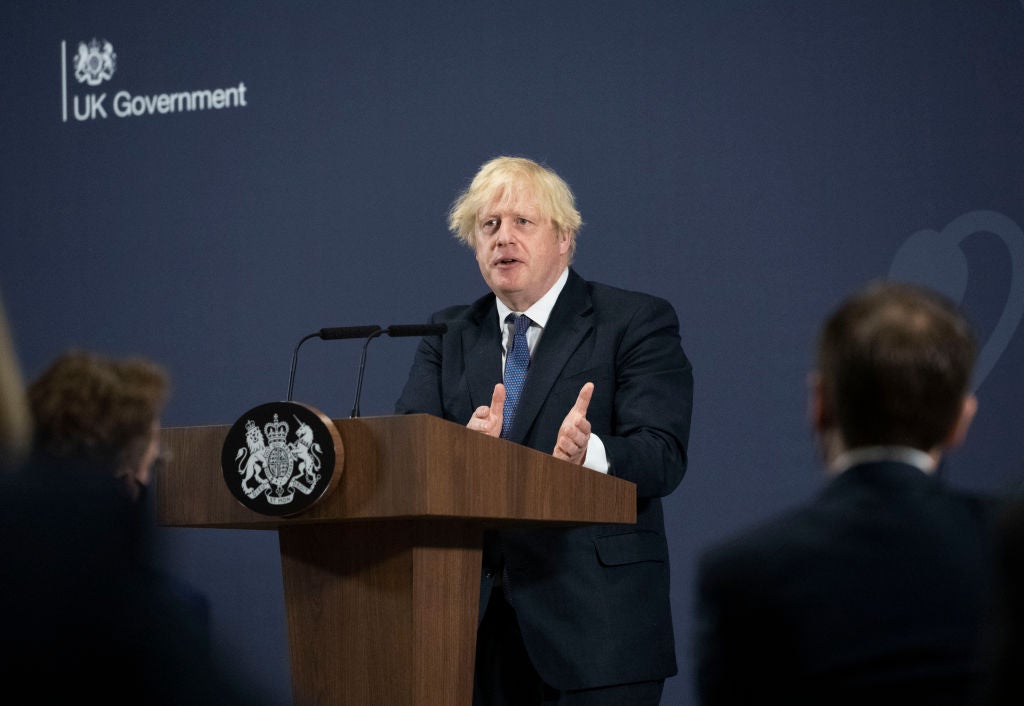‘Levelling up’ has become a slogan in search of a policy
Genuine levelling up will require more than short-term handouts to spruce up rundown high streets, writes Andrew Grice


It was a good idea at the time but, two years after Boris Johnson became prime minister, “levelling up” remains a slogan in search of a policy. He hoped it would send a “we care” signal to voters in the north and Midlands, showing he had not forgotten why they supported him in the Brexit referendum and 2019 election.
But the Conservatives’ own focus groups suggest “levelling up” is a poor, barely understood slogan. Voters in the “red wall” are confused by it. When it is explained, many view it as annoying; they rallied behind Johnson because they felt ignored rather than to see their region become as prosperous as London overnight, which they know is not credible.
“What do we do now?” was the question posed anxiously by Johnson’s close allies after his 2019 triumph. They knew what they wanted to do on Brexit but had little idea how to honour their level-up pledge. The excuse that the government has been side-tracked by the pandemic is only half the picture; Johnson’s speech on Thursday, which was being talked up only a few weeks ago as a big moment, showed he is still not sure what he wants levelling up to be. It was a mistake to make it. In an email to Tory supporters, he hailed it as a “landmark speech” but calling it “at least the skeleton of what to do” was stretching it; even skeletons have bare bones.
Spooked by their party’s defeat in the Chesham and Amersham by-election, Tory MPs and councillors in the south are jittery because, as one home counties council leader told me, “our people think levelling up is all about their taxes going up to fund projects in the north”. While Johnson rightly stuck to his guns on the need for more housebuilding, his speech was more about what levelling up is not about, an attempt to reassure the south the goal is not “levelling down”. Beware the politician who tells you what they’re against; it usually means they’re not sure what they’re for.
The prime minister insisted that “levelling up is not a jam-spreading operation” (even if he always offers jam tomorrow). But so far it has mainly funnelled government grants into Tory-held seats in the north and Midlands – a barely disguised version of America’s long-established pork barrel politics. The Tory message is in effect: vote for us and get money for your town. It worked at the Hartlepool by-election in May.
Last year the Commons public accounts committee found that allocations from the towns fund were based on “vague and sweeping assumptions,” raising concerns that decisions were politically motivated. In some cases, towns were selected by ministers despite being identified by civil servants as a very low priority. Forty of the 45 areas to benefit this year are represented by Tory MPs; the system conveniently gives Rishi Sunak’s Richmond constituency in Yorkshire a higher priority than Sheffield or Salford.
The process is very top down. Despite Johnson’s rhetoric about devolution, will he really hand power and money to local Labour politicians? I doubt it, even though Andy Street, Tory mayor of the West Midlands, acknowledges the need to end “the begging bowl culture”.
Genuine levelling up will require more than short-term handouts to spruce up rundown high streets. The crucial test is whether Sunak puts big money behind it in his government-wide spending review this autumn. That will require more than Johnson’s beloved infrastructure projects; the chancellor will also need to boost day-to-day spending on public services, reversing huge cuts to local authorities in the red wall during the austerity era. Ending the £20-a-week top-up to universal credit on 1 October will level down the north and Midlands, where one in three households will lose £1,000 annually, compared to one in five in the southeast, according to the Resolution Foundation think tank. The fear that stalks red wall Tory MPs is that, as one put it, “there will still be no substance because there’s no money after the pandemic”.
The other flaw: there are no targets to measure whether Johnson’s flagship policy is working. Allies fret that, because real change will inevitably take years, initial results would highlight failure, handing ammunition to Labour. But targets must be included in the white paper later this year being drawn up by Neil O’Brien, one of the brightest stars on the Tory backbenches. An awful lot now rests on his shoulders; he must turn Johnson’s familiar shopping list into a coherent strategy.
Ministers admit privately the white paper offers the last chance to make levelling up work before the next general election, by when red wall voters will want to see some tangible progress. That won’t be easy.



Join our commenting forum
Join thought-provoking conversations, follow other Independent readers and see their replies
Comments